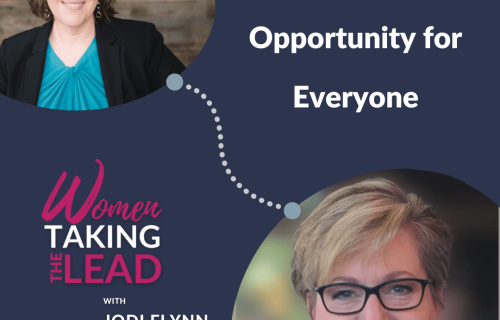
100% Jodi: Do You Feel Worthy to Invest in Yourself?
Click the play button to listen to the podcast episode.
As with the last episode of Women Taking the Lead I’m asking, for your career, who do you go to for help and support?
Help comes in many forms and from a variety of sources. Some help you can get for free and some help costs money.
While I always recommend utilizing your free help when appropriate, and for as many things as you can, it’s important to know that free resources will only get you so far.
We can get stuck in our careers or with a situation at work because we keep going back to the people in our lives whom will offer their help for free, but who don’t have the expertise to guide us through our challenges effectively.
Knowing whom you can go to for what will save you time and energy, and not put any undue pressure on those in your support system who want to help, but can’t give you what you need.
This episode will cover the types of career helpers you can hire to invest in yourself, and how to utilize those people.
Why Seek Out Help That Costs Money?
The last episode of Women Taking the Lead covered various people in your life who can give you career help for free. Those covered were family, friends, mentors and sponsors.
I’m going to underscore that, as someone who knows the value of a dollar, I appreciate and encourage utilizing those people in your life who would love to offer you their help free of charge.
What this episode is covering is the help you can get from trained professionals that your free helpers cannot give you, even though they love you and want the best for you.
Now, when introducing money into the conversation, I have to cover some ground because we all have stories around money. Whether it’s how much money it’s okay to spend on ourselves or even what we’re allowed to seek professional help for.
There are many reasons why we, as ambitious (perhaps perfectionistic) women, don’t take the action and hire someone to help us…even for something as high-stakes as our career.
Do any of these ring true for you?
- You lean on Google, YouTube, or podcasts for all the answers. The assumption being, whatever the challenge is, with a little more knowledge you should have no problem doing what you need to do.
- You’re used to figuring things out on your own or with your free help. More often than not, people are coming to you for help. The idea of giving someone money to help you is a little mind boggling.
- You rely on your company to tell you what training and development you need. So, you think if it’s not suggested by your company, you probably don’t need it.
- You belong to a group or culture where there’s a stigma around paying for certain kinds of help.
- You believe you should be paying for any training and development not offered by your company out-of-pocket, but you have a very tight budget.
- You’ve never made this type of an investment before. Nor has anyone close to you. You’re not sure what a reasonable price for the service would be. You already feel like a fish-out-of-water so hesitate to make inquiries.
- If you’re a people-pleaser you may even avoid a discovery-call with a professional service provider for fear you may have to tell them you’ve decided not to hire them, and that would make you feel bad on top of everything else you’ve got going on.
There was a time I needed help desperately and I avoided engaging with any professionals for many of these reasons. Primarily it was because I didn’t want to waste their time if I ultimately couldn’t afford their services. I would do as much digging around, vetting, and utilizing free resources before ever making my existence known to a particular professional.
All this to say, if you know you typically avoid paying for help, and invest in yourself, I get it. Sometimes it’s really hard to make the decision and take the first step.
I’ve had many clients who didn’t reach out to me until they were at their absolute wit’s end and reached out desperately for a life line. But they were always glad that they did. And in my experience, once I found the provider I could connect with, I was so glad I had made the decision to hire them.
Now let’s talk about the kind of help you can hire as a way to invest in yourself and why this help, and you, are worth the money.
By Hiring You Invest in Yourself
Therapist
With more and more workers reporting mental health issues as a result of the pandemic, the stigma around seeking help for mental health issues is going away.
If you…
- feel like your emotions are out of your control
- are having more frequent emotional confrontations than previously experienced
- have excessive worry, fears or extreme feelings of guilt
- experience extreme mood changes
- have been withdrawing from friends and activities
- or have experienced significant tiredness, low energy or problems sleeping
…a therapist can be a fantastic resource to you.
These experiences have become so common many people have been on long waiting lists, waiting to be able to work with a therapist.
A therapist’s typical functions are to help their patient heal by delving into their problems, overcome issues, and sometimes manage chronic mental illness.
Through working with a therapist, you will also increase your emotional intelligence. This is the ability to identify and manage your emotions, and those of others. The more emotional intelligence you have, the easier it is to lead effectively.
Can therapy be good for your career? Yes, yes it can. And many companies are making sure mental health is a prominent part of your benefits package. And if therapy is covered by your benefits package you need only spend time to invest in yourself.
Career Counselor
Career counselors help you understand your professional path and figure out the right career fit for you.
To help you think about what it is you want to do for work they may administer personality tests, interest inventories, or other assessments to help you identify potential careers that may be a good fit for you.
A career counselor can help you to create a plan for your career path, or to identify aspects of a job that you would value (such as working with people, managing others, working independently, etc.). This way you are more empowered to choose a job that is the best fit for you.
Counselors are tasked with helping you find a career that fits your:
- Interests, talents, skills, and values
- Desired work-life balance
- Desired lifestyle
- Salary needs or aspirations
They may give you tips or strategies to get the job you want, but as a rule, it isn’t their primary goal.
If you’re changing careers and you’re not sure where you want to go, then consider working with a career counselor. It is a great way to invest in yourself!
Invest in Yourself with Time
Would you be interested in discovering your strengths as a leader and identifying your gaps, so you can be more confident and competent in your leadership?
I developed the Leadership Operating System Quiz, for women like you. This holistic self-assessment allows you to assess your effectiveness in leading others, leading yourself, your ability to influence, your ability to manage your energy, and your communication skills.
It’s a way for you to quickly identify where you could focus your developmental resources. And it’s not about getting bad news. This quiz will also be an acknowledgement of where you are getting a lot of things right.
Those who have used the Leadership Operating System Quiz have described the questions as engaging and thought-provoking. They appreciated getting insights into which areas to focus on, and really liked the resources that were provided at the end.
It will take you about 3 minutes for you to complete. If you think about it, that’s a quick turnaround to gain insight into what would improve your effectiveness as a leader and make being a leader easier and more enjoyable.
Go to womentakingthelead.com/leadership-abilities-inventory to find out more and to take the Leadership Operating System Quiz.
Coach
Before I distinguish between a couple of different types of coaches you could work with to invest in yourself for your career, let me talk a little bit about what coaching is and isn’t because although it’s a term that is used a lot, not many people understand what professional coaching truly is.
Coaching is a partnership. It is a collaborative effort that is solely based on what the client would like to accomplish. The client brings their goals, and the obstacles to those goals, and the coach brings objectivity, curiosity, nonjudgment and great questions.
This is why, though your manager may use some coaching skills to develop you and your team members, they are very invested in you achieving specific goals that impact their own goals. For this reason it’s very difficult for them to suspend their own needs, wants, and goals to give you the space to explore your own development.
As opposed to a mentor, a coach does not use their personal experiences as a model of success for the person they are coaching. The person being coached is the expert on their experience. The coach is the expert on the coaching process. Through the coaching process, a coach can help a client identify the best strategy for themselves to navigate a challenge.
Coaches focus on solutions and action. They do not dwell on the past. Instead, in the coaching process, the past is recognized and accepted. The focus is primarily on helping their client get from where they are now to where they want to be.
What my clients appreciate about coaching is having the space to let down their guard, say whatever it is they need to say without being judged or having their words used against them at a later time. My clients have a safe place they can be completely honest.
I come with curiosity and ask questions designed to get them thinking and soon my client is looking at their challenge from a new perspective. From this new perspective they can see solutions and opportunities that they couldn’t see before.
As you can imagine, seeing new solutions and opportunities makes them feel relief, hope, a renewed energy and motivation, and confidence that they will overcome their challenge.
Career Coach
Whereas a Career Counselor will help to point you in the right direction, a Career Coach will help you stay moving and reach your destination.
Career coaching is much more often focused on helping you meet your goals: get a new job (even if that is a job in a new career area), or move ahead in the career you’re in.
They will probably help you focus on honing your interview skills, negotiating compensation packages, navigating office politics, or getting the promotion. They often offer help and advice for your resume and LinkedIn profile so you can better market yourself to potential employers.
A career coach probably won’t administer personality tests or otherwise guide you to discovering your dream career—but they may offer suggestions on what job you could be marketable for based on your experience. They may offer suggestions you hadn’t thought of. Though it would be up to you to determine if that’s a route you want to go.
A career coach can also help you realize any underlying thoughts, assumptions, or biases that hold you back from success.
If you’re happy in your current career but want to move ahead or get a new job; or if you know what area you want to transition to, you may want to invest in yourself by talking to a career coach.
Leadership or Executive Coach
Leadership coaching has much of the same focus as executive coaching. In fact, it is sometimes called a subset of executive coaching. The goal of a leadership coach is to support you in gaining awareness about how to become a more inspirational, impactful leader with strong communication skills.
With leadership coaching, the client is typically a manager or team leader, and may also be a C-level executive. If you are in leadership over a team or department or will soon become a people leader, you can benefit from the services of a leadership coach.
The value of a leadership coach is largely in the partnership that is formed between you and the coach. If you are a leader, it can be a lonely position and a coach can perform several roles for you.
Often, the main role is that of being a partner with you in your professional development and achievement of your goals. What you openly share, along with great questions asked by your coach, you have an opportunity to gain insight into your leadership style and how it may be helping or hindering you and your organization.
Because of the confidentiality in a coaching partnership, you will likely be more willing to be open and completely honest with your coach, which makes the coaching more effective.
Your coach will support you to both explore your role more thoroughly and engage with the people in your sphere more effectively. Your coach often will administer assessments, so you can gain awareness into yourself and find your own strengths and weaknesses, and build upon those to develop your personal style of leadership.
Is this a good way to invest in yourself? It certainly is.
Don’t spin in place
I’ve seen many women get stuck because they see hiring a therapist, counselor or coach as an expense rather than as an investment. Many women are hesitant to invest money in themselves. Or they don’t think their company will invest the money in them, so they don’t even ask.
I’ve been there myself. I Googled, I YouTubed, I went to friends for guidance, I asked friends of friends at parties for guidance. Ultimately, I needed someone who not only understood the challenges of being a woman in leadership, but understood the make-up of a highly ambitious, high achieving woman in leadership (who perhaps has some Type A tendencies to boot).
I needed not only someone who understood perfectionism and people-pleasing, I need someone who could help me manage those tendencies so they no longer held me back and made my life miserable.
I needed someone who could see my ambition and my drive as strengths and help me to direct that energy so I could achieve the life and the career that I wanted.
I love my family, my friends, my mentors and those who sponsored me throughout my career, but they were not equipped to help me understand me. They couldn’t help me to break down how I was perceiving others and the situations I was in, and how that perception was impacting my ability to show up and be myself, and respond in ways that made me feel both good in the moment, and in retrospect.
How to Choose with Whom to Invest in Yourself
To determine if someone you’re considering is right for you, investigate. Read through their website, the descriptions of what they offer, and their LinkedIn profiles. See what others have to say about them. If you’re still not sure, ask for a quick consultation where you can outline your problem, get your questions answered and the two of you can determine if it’s a good match and a good way to invest in yourself.
Let’s Chat!
If you’re interested in finding out more about my process, the cost of coaching, or how to ask your employer to pay for you to work with a coach, schedule a time to chat with me.
You can also access the checklist that will help you prepare to ask your company to sponsor you to work with a coach. https://womentakingthelead.com/checklist
As always, I hope this was of value to you and here’s to your success!
Resources
Apply to be on an “On-Air Coaching” episode: Are you a female leader who has been promoted in the last year? You are invited to apply to be on the podcast.
Checklist to Ask Your Company for Coaching: Would coaching help you become a stronger leader? Wondering if your company would pay? It doesn’t hurt to ask!
Leadership Operating System Inventory. Wondering what kind of Leadership traits you have? Take this FREE, FAST self-assessment and find out more about yourself as a Leader.
Leadership Coaching: If you interested in finding out more about my coaching process, the cost of coaching, or how to ask your employer to pay for you to work with a coach, schedule a call with me.
Accomplished: How to Go from Dreaming to Doing: The book containing a simple, step by step system that gives you the foundation and structure to take your goals and make them happen.
The Women Taking the Lead Podcast
If you enjoyed this episode, follow in Apple Podcasts, Spotify, Google Podcasts, iHeart Radio, Stitcher Radio, Amazon Music or Pandora and never miss out!


